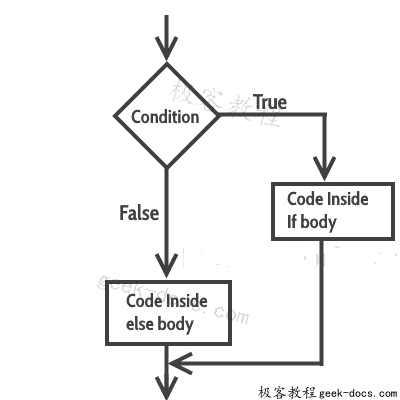在上一个教程中,我们学习了如何在 C 中使用if语句。在本指南中,我们将学习如何使用 C 语句中的if else,嵌套if else和else语句。
C if-else语句
if else语句的语法:
如果条件返回true,则执行if正文内的语句,并跳过else正文内的语句。
如果条件返回false,则跳过if正文中的语句,并执行else中的语句。
if(condition) {
// Statements inside body of if
}
else {
//Statements inside body of else
}
if-else语句的流程图

if-else语句的示例
在此程序中,要求用户输入年龄,并根据输入,if..else语句检查输入的年龄是否大于或等于 18。如果满足此条件,则显示消息“您有资格投票”,但是,如果条件不符合,则显示不同的消息“您没有资格投票”。
#include <stdio.h>
int main()
{
int age;
printf("Enter your age:");
scanf("%d",&age);
if(age >=18)
{
/* This statement will only execute if the
* above condition (age>=18) returns true
*/
printf("You are eligible for voting");
}
else
{
/* This statement will only execute if the
* condition specified in the "if" returns false.
*/
printf("You are not eligible for voting");
}
return 0;
}
输出:
Enter your age:14
You are not eligible for voting
注意:如果只有一个语句出现在if或else正文中,那么你不需要使用大括号(括号)。例如,上面的程序可以像这样重写:
#include <stdio.h>
int main()
{
int age;
printf("Enter your age:");
scanf("%d",&age);
if(age >=18)
printf("You are eligible for voting");
else
printf("You are not eligible for voting");
return 0;
}
C 嵌套if-else语句
当if else语句出现在另一个if或else的正文内时,则称为嵌套if-else。
嵌套if语句的语法:
if(condition) {
//Nested if else inside the body of "if"
if(condition2) {
//Statements inside the body of nested "if"
}
else {
//Statements inside the body of nested "else"
}
}
else {
//Statements inside the body of "else"
}
嵌套if-else的示例
#include <stdio.h>
int main()
{
int var1, var2;
printf("Input the value of var1:");
scanf("%d", &var1);
printf("Input the value of var2:");
scanf("%d",&var2);
if (var1 != var2)
{
printf("var1 is not equal to var2\n");
//Nested if else
if (var1 > var2)
{
printf("var1 is greater than var2\n");
}
else
{
printf("var2 is greater than var1\n");
}
}
else
{
printf("var1 is equal to var2\n");
}
return 0;
}
输出:
Input the value of var1:12
Input the value of var2:21
var1 is not equal to var2
var2 is greater than var1
C – else..if语句
当需要检查程序中的多个条件时,else..if语句很有用,可以使用else..if语句避免嵌套if-else块。
else..if语法的语法:
if (condition1)
{
//These statements would execute if the condition1 is true
}
else if(condition2)
{
//These statements would execute if the condition2 is true
}
else if (condition3)
{
//These statements would execute if the condition3 is true
}
.
.
else
{
//These statements would execute if all the conditions return false.
}
else..if语句的示例
让我们在讨论嵌套的if..else时采用我们在上面看到的相同示例。我们将使用else..if语句重写相同的程序。
#include <stdio.h>
int main()
{
int var1, var2;
printf("Input the value of var1:");
scanf("%d", &var1);
printf("Input the value of var2:");
scanf("%d",&var2);
if (var1 !=var2)
{
printf("var1 is not equal to var2\n");
}
else if (var1 > var2)
{
printf("var1 is greater than var2\n");
}
else if (var2 > var1)
{
printf("var2 is greater than var1\n");
}
else
{
printf("var1 is equal to var2\n");
}
return 0;
}
输出:
Input the value of var1:12
Input the value of var2:21
var1 is not equal to var2
正如您所看到的那样,只执行
if正文中的语句。这是因为在该语句中,只要满足条件,就会执行该块内的语句,并忽略其余的块。
重要事项:
else和else..if是可选语句,只有if语句的程序运行正常。- 否则,如果没有
if,则无法使用。 if else..if块中可以有任意数量的else..if语句。- 如果没有满足任何条件,则执行
else块中的语句。 - 就像关系运算符一样,我们也可以使用逻辑运算符,如 AND(
&&),OR(||)和 NOT(!)。
 极客教程
极客教程